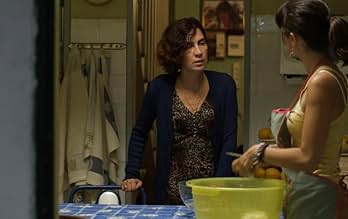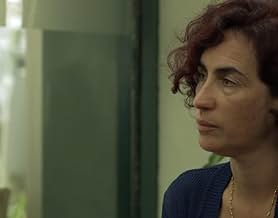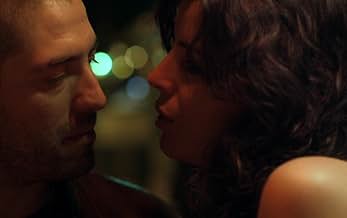CALIFICACIÓN DE IMDb
7.3/10
2.1 k
TU CALIFICACIÓN
Agrega una trama en tu idiomaA regular family living in the outskirts of Lisbon sees the serenity of their lives shaken beyond any remedy within a week.A regular family living in the outskirts of Lisbon sees the serenity of their lives shaken beyond any remedy within a week.A regular family living in the outskirts of Lisbon sees the serenity of their lives shaken beyond any remedy within a week.
- Dirección
- Guionista
- Elenco
- Premios
- 21 premios ganados y 9 nominaciones en total
Maria João Vaz
- Algarvio
- (as João Vaz)
- Dirección
- Guionista
- Todo el elenco y el equipo
- Producción, taquilla y más en IMDbPro
Opiniones destacadas
I would have really liked to give this film 8-9 stars. Excellent photography and editing, which make the spectator feel with great realism the claustrophobic atmosphere of the tiny family house of the protagonists and other sceneries of the film. A masterly use of the sounds surrounding the action, with the omnipresent background noise of the TV and the various noises from the neighborhood which add authenticity to the scenes and the story. Very good performances of all actors. And a solid story about the lives of the members of a working class family, with perfectly depicted one-to-one and overall interactions between them, and which develops seamlessly and with increasing interest throughout the film (despite its more than 3 hours of length!). You feel a part of the scene often, understanding the attitudes and reactions of the different personages, each with a particular story at the center of his/her life, yet affected and conditioned by the relation and interactions with the rest of the personages.
Then why that weird soap opera-like twist with references to a Greek myth in the middle of the film???. It adds nothing to it, and instead makes the story less sound and consistent, twisted, and more proper of a TV serial. Few times a very good film was spoiled by so little, but so it is...
Then why that weird soap opera-like twist with references to a Greek myth in the middle of the film???. It adds nothing to it, and instead makes the story less sound and consistent, twisted, and more proper of a TV serial. Few times a very good film was spoiled by so little, but so it is...
10vitor_04
This is a movie that i'll never forget. Rita Blanco is in the best (and when i say the best i mean the best) performance i've ever seen in cinema. Yes, i know - i'm Portuguese, it's predictable i would say this is a great movie. But the truth is that Joao Canijo sees the cinema exactly how i see it, going deep on characters and going deep on their misery, always with a peace of comedy and truth in it. it's not a complicated history, the sexual content in it it's not unnecessary and the music background was not written by big contemporany compositors. The only concern of Joao was to make a movie faithful to the inconditional love story behind a poor family with huge problems appearing.
This sprawling drama about a Portuguese family combines melodrama and social realism so inventively that it practically occupies a genre of its own. Writer-director Joao Canijo grounds the movie in vivid observations of the Lisbon public housing complex where much of the action occurs, and his characterizations—developed, Mike Leigh-style, in close collaboration with the cast--have a similarly gritty authenticity. Yet the movie is also richly stylized, with old- fashioned tracking shots and compositions that allow for two conversations at once, and some narrative developments have the force of Greek tragedy. What emerges is an operatic portrayal of the working poor in which each character's struggle seems monumental. Rita Blanco and Rafael Morais are on top of their game with such deep and complex acting that makes us shiver. One of the best movies I've seen, ever! And definitely the best of 2011.
Portuguese director Joao Canijo returns with his eighth feature, Blood of My Blood, (his first fictional outing since 2007's Misbegotten) a sprawling, all consuming portrait of one week in the life a matriarchal run familial unit in the slums outside Lisbon, and may indeed be his masterpiece. Inevitably, there's no denying a comparison of technique with Altman and Mike Leigh (Canijo spent two years developing the characters with the actors via a series of workshops as Leigh does), but the film stands quite firmly as an often uncomfortable, unpleasant, and always fascinating family saga that would, in a fair world, finally open up the English speaking market to Canijo's previous directorial efforts, which date back to the early 80s.
In Padre Cruz, a slum on the edge of Lisbon, the Fialho clan, whose workable, but makeshift daily existence is about to be severely shaken. The family matriarch, Marcia (Rita Blanco) has singlehandedly raised her two children, Joca (Rafael Morais) and Claudia (Cleia Almeida), and she works in a restaurant where she has a distant but apparently fulfilling relationship with Helder (Fernando Luis). Marcia's younger sister, Ivete (Anabela Moreira), a hairdresser, also lives with them, her goal to get breast implants in an effort to retain her waning sex appeal, as time seems to be taking its toll on her. Besides daily squabbles and bickering between the usual amiable relatives, which includes Joca's girlfriend, Erica (Wilma de Brito) and Claudia's boyfriend, Cesar (Francisco Tavares) who works a security guard at the same grocery story with Claudia, it's Marcia's children that create a situation that not even the fierce convictions of their flinty mother can put right.
We first meet Joca as he explains to Telmo (Nuno Lopes), the dealer he works for, that he has just been robbed by the buyer he had been sent to meet. Telmo doesn't take this news too easily, and we learn that wild child Joca has been in prison already for drug trafficking. But Telmo's not so sure that Joca's being up front with his missing drugs. Meanwhile, Claudia, currently going to nursing school and planning a wedding with the jealous and needy Cesar, tells her mother she's in love with a married man. Marcia discovers the man, Alberto (Marcello Urgeghe) is one of Claudia's teachers, and travels to Alberto's fancy, upscale neighborhood to confront him about his relationship with Claudia. Throughout several interactions between Alberto and Claudio, we learn varying bits of information that complicate the situation, though something drastic has to take place before either Alberto or Claudia decide to listen to Marcia.
Canijo employs a novel split screen technique in his opening frames, which he repeats several times throughout the feature, using the camera to dissect rooms, using only a wall as separation. On one side, Joca and Telmo heatedly bickering about drug money, with Telmo's two young daughters delicately listening at the breakfast table on the other side, and so on. Canijo often catches characters in the same room or an adjacent space, their conversations overlapping at the same time. But as the film progresses, these busied frames give way to solemn close-ups, grotesquely calming the background to focus on the important and prophetic details we need to clue in on, not unlike tightening the coil of a noose. Even a karaoke bar (presented by Lord Jim Karaoke, a possible nod to Conrad's classic novel concerning the abandonment of a ship in distress) gives us competing, overlapping songs, with Cesar singing a Joe Cocker duet and Ivete crooning "Just Too Good To Be True," to Telmo, a tune which will haunt us again later. We soon leave behind the eerie green nighttime glow in Marcia's apartment, where the camera roves around the property like a hungry insect, until we end up in one sweaty, dark apartment where we observe one of the most upsettingly degrading scenarios (employing, once again, the Four Seasons) you're apt to see this year for the (almost) final outcome of the foolhardy actions of Joca and Claudia.
The two year character preparation obviously paid off for Canijo and his cast. There's definitely a fluidity between the Fialho's, even as they wander through the more sensationally salacious aspects of the narrative. A longer version, clocking in at over three hours, exists, and the material has also been prepared to air in a three part episode version for television, perhaps a more accessible venue due to its lengthy, but utterly worthwhile, running time. After its final frames, you can't help but ruminate on the monstrously perverted notions of the lengths people are willing to go (as well as what they're not willing to do) for those that are considered, in this perfectly titled film, Blood of My Blood.
In Padre Cruz, a slum on the edge of Lisbon, the Fialho clan, whose workable, but makeshift daily existence is about to be severely shaken. The family matriarch, Marcia (Rita Blanco) has singlehandedly raised her two children, Joca (Rafael Morais) and Claudia (Cleia Almeida), and she works in a restaurant where she has a distant but apparently fulfilling relationship with Helder (Fernando Luis). Marcia's younger sister, Ivete (Anabela Moreira), a hairdresser, also lives with them, her goal to get breast implants in an effort to retain her waning sex appeal, as time seems to be taking its toll on her. Besides daily squabbles and bickering between the usual amiable relatives, which includes Joca's girlfriend, Erica (Wilma de Brito) and Claudia's boyfriend, Cesar (Francisco Tavares) who works a security guard at the same grocery story with Claudia, it's Marcia's children that create a situation that not even the fierce convictions of their flinty mother can put right.
We first meet Joca as he explains to Telmo (Nuno Lopes), the dealer he works for, that he has just been robbed by the buyer he had been sent to meet. Telmo doesn't take this news too easily, and we learn that wild child Joca has been in prison already for drug trafficking. But Telmo's not so sure that Joca's being up front with his missing drugs. Meanwhile, Claudia, currently going to nursing school and planning a wedding with the jealous and needy Cesar, tells her mother she's in love with a married man. Marcia discovers the man, Alberto (Marcello Urgeghe) is one of Claudia's teachers, and travels to Alberto's fancy, upscale neighborhood to confront him about his relationship with Claudia. Throughout several interactions between Alberto and Claudio, we learn varying bits of information that complicate the situation, though something drastic has to take place before either Alberto or Claudia decide to listen to Marcia.
Canijo employs a novel split screen technique in his opening frames, which he repeats several times throughout the feature, using the camera to dissect rooms, using only a wall as separation. On one side, Joca and Telmo heatedly bickering about drug money, with Telmo's two young daughters delicately listening at the breakfast table on the other side, and so on. Canijo often catches characters in the same room or an adjacent space, their conversations overlapping at the same time. But as the film progresses, these busied frames give way to solemn close-ups, grotesquely calming the background to focus on the important and prophetic details we need to clue in on, not unlike tightening the coil of a noose. Even a karaoke bar (presented by Lord Jim Karaoke, a possible nod to Conrad's classic novel concerning the abandonment of a ship in distress) gives us competing, overlapping songs, with Cesar singing a Joe Cocker duet and Ivete crooning "Just Too Good To Be True," to Telmo, a tune which will haunt us again later. We soon leave behind the eerie green nighttime glow in Marcia's apartment, where the camera roves around the property like a hungry insect, until we end up in one sweaty, dark apartment where we observe one of the most upsettingly degrading scenarios (employing, once again, the Four Seasons) you're apt to see this year for the (almost) final outcome of the foolhardy actions of Joca and Claudia.
The two year character preparation obviously paid off for Canijo and his cast. There's definitely a fluidity between the Fialho's, even as they wander through the more sensationally salacious aspects of the narrative. A longer version, clocking in at over three hours, exists, and the material has also been prepared to air in a three part episode version for television, perhaps a more accessible venue due to its lengthy, but utterly worthwhile, running time. After its final frames, you can't help but ruminate on the monstrously perverted notions of the lengths people are willing to go (as well as what they're not willing to do) for those that are considered, in this perfectly titled film, Blood of My Blood.
Going way over the safety of ninety minutes into the territory that is so often too long, at two hours twenty, Blood of my Blood easily justifies this extended playtime through captivating characters, patience, flawless pacing and a firm central premise that is supported with every tool at the filmmaker's disposal. The film utilizes a feature that often assists the longer films, it makes use of a large cast of characters. Though having some major focus, the film manages to drift around the experiences of several generations of one family, living in a low-income area of urban Portugal. The linchpin is the mother Marcia, who is a definite mother of the year candidate, just as Rita Blanco, who plays her superbly, is easily my performance of the festival so far. The other major characters are her twenty something kids Cláudia (Cleia Almeida) and Joca (Rafael Morais), then there's their partners, and Marcia's sister Ivete, who pretty much all live in the same tiny flat. Amongst the many links between characters, there are two central plot strands that stand out. Primarily, there's Cláudia's affair with her college professor and her mother's objections to it. Yet almost as prominent is Joca's hazardous attempts to rip off his drug dealer boss. These are quite conventional plot setups and therefore in no way do justice to the originality with which the film is put together. The heart of the film, its soul and its central premise is its interconnectedness. In terms of the plot, the various strands and characters – in addition to this one family at its core – often refer to one another, cross each other's paths, or their relations to one another gradually become apparent. In grander thematic terms, this interconnectedness is related to the strength of community in such a dense, low-income area. This results in the familial bonds being watertight, and people seem sure of themselves in ways that characters rarely do in the countless 'middle-class guilt, straight white men with lost souls' narratives that populate a great deal of art-house hits. In this respect, Blood of my Blood avoids depicting this community with a 'pity the poor' agenda, and although it doesn't suggest it is an aspirational way of life, it certainly doesn't give the usual 'unbreakable cycle destined to fail' scenario.
I suggest that should it be read as such, it will be by people that haven't themselves lived in, or experienced such a low-income community, where there are only two degrees of separation between anyone you might run into in a limited social circle; people that don't know how, within such a microcosm, people are looked out for. The plot very clearly postulates how family are there for one another in the way that Marcia stands by her daughter with such passion and strength, and how the more complex relationship between Jaco and his aunt Ivete plays out. But further to this, we see many subtle narrative elements that illustrate people looking out for each other, or having more than their own narrow motivations at the front of their mind. This is contrasted with the middle class teacher who Cláudia is having an affair with, who seems trapped in an arrested development, not clearly thinking about the wellbeing of Cláudia or for his own wife and family, or even for himself, acting in a familiar self-defeating manner (a human trait depicted so vividly by another outstanding film at the festival Post Tenebras Lux). The film lays the foundations for all these developments at pretty much the outset. After the first scene illustrates the neighborhood they populate and the hazards it contains, the following scene is an iconic dinner table scene. Always a narrative tool to develop and showcase family dynamics, this scene introduces all characters subtly, setting them up with a view to filling in the details as the film progresses. Rather than spoon-feeding exposition on individual characters at this point, the film is much more concerned with establishing the importance of the connections.
Further to these narrative examples, all formal elements worked in harmony with this premise, rather than being used for their own sake with style rather than substance. The interconnected theme was supported by inventive techniques such as the camera coming away from a conversation to allow another conversation to seep into the frame, with both then going on simultaneously; or by the fact that there is very rarely just one thing going on in frame; or that in the absence of any non-deigetic sound or music, the radio or TV can be heard or seen in the background pretty much throughout. This persistently emphasises the hectic nature of this life and that none of these people are islands. Additionally, the long takes – along with being a convention of non/anti-Hollywood cinema – act to gel the different characters together as part of the same organic space. Therefore form and content both support each other to show these characters to be connected as part of this not only literally, but socio-culturally and meta-physically densely populated space.
In spite of the melodramatic plot strands mentioned above, the film is more than anything an earnest and insightful snapshot of life. Over the final credits we hear some Portuguese hip-hop, featuring a chorus comprising of the sample of an American track repeating the words 'street life'. This sums the film up as far as I am concerned; it is simply a slice of street life. I don't think it was relentlessly grim, but nor do I think it was overly celebrated or glamorized; it was simply a slice of life.
I suggest that should it be read as such, it will be by people that haven't themselves lived in, or experienced such a low-income community, where there are only two degrees of separation between anyone you might run into in a limited social circle; people that don't know how, within such a microcosm, people are looked out for. The plot very clearly postulates how family are there for one another in the way that Marcia stands by her daughter with such passion and strength, and how the more complex relationship between Jaco and his aunt Ivete plays out. But further to this, we see many subtle narrative elements that illustrate people looking out for each other, or having more than their own narrow motivations at the front of their mind. This is contrasted with the middle class teacher who Cláudia is having an affair with, who seems trapped in an arrested development, not clearly thinking about the wellbeing of Cláudia or for his own wife and family, or even for himself, acting in a familiar self-defeating manner (a human trait depicted so vividly by another outstanding film at the festival Post Tenebras Lux). The film lays the foundations for all these developments at pretty much the outset. After the first scene illustrates the neighborhood they populate and the hazards it contains, the following scene is an iconic dinner table scene. Always a narrative tool to develop and showcase family dynamics, this scene introduces all characters subtly, setting them up with a view to filling in the details as the film progresses. Rather than spoon-feeding exposition on individual characters at this point, the film is much more concerned with establishing the importance of the connections.
Further to these narrative examples, all formal elements worked in harmony with this premise, rather than being used for their own sake with style rather than substance. The interconnected theme was supported by inventive techniques such as the camera coming away from a conversation to allow another conversation to seep into the frame, with both then going on simultaneously; or by the fact that there is very rarely just one thing going on in frame; or that in the absence of any non-deigetic sound or music, the radio or TV can be heard or seen in the background pretty much throughout. This persistently emphasises the hectic nature of this life and that none of these people are islands. Additionally, the long takes – along with being a convention of non/anti-Hollywood cinema – act to gel the different characters together as part of the same organic space. Therefore form and content both support each other to show these characters to be connected as part of this not only literally, but socio-culturally and meta-physically densely populated space.
In spite of the melodramatic plot strands mentioned above, the film is more than anything an earnest and insightful snapshot of life. Over the final credits we hear some Portuguese hip-hop, featuring a chorus comprising of the sample of an American track repeating the words 'street life'. This sums the film up as far as I am concerned; it is simply a slice of street life. I don't think it was relentlessly grim, but nor do I think it was overly celebrated or glamorized; it was simply a slice of life.
¿Sabías que…?
- TriviaPortugal's official submission to the Best Foreign Language Film category of the 85th Academy Awards 2013.
Selecciones populares
Inicia sesión para calificar y agrega a la lista de videos para obtener recomendaciones personalizadas
- How long is Blood of My Blood?Con tecnología de Alexa
Detalles
- Tiempo de ejecución2 horas 11 minutos
- Color
- Mezcla de sonido
- Relación de aspecto
- 1.85 : 1
Contribuir a esta página
Sugiere una edición o agrega el contenido que falta































